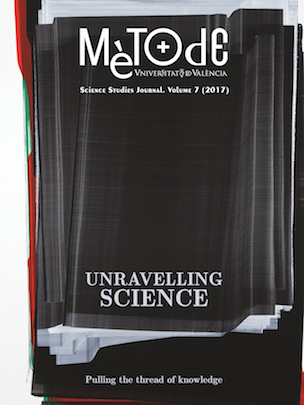Science and ideology: The case of physics in Nazi Germany
DOI:
https://doi.org/10.7203/metode.7.7665Palabras clave:
Nazism, German physics, science and politics, Peter Debye Resumen
Resumen
Science is not «above» politics and ethics: it is intrinsically political, and constantly raises ethical dilemmas. The consequences of evading such issues were made particularly clear in the actions of scientists working in Nazi Germany in the 1930s and 40s. The accusation in 2006 that Dutch physicist Peter Debye was an opportunist who colluded with the Nazis reopened the debate about the conduct of physicists at that time. Here I consider what those events can tell us about the relationship of science and politics today. I argue that an insistence that science is an abstract, apolitical inquiry into nature is a myth that can leave it morally compromised and vulnerable to political manipulation.
 Descargas
Descargas
 Citas
Citas
Ball, P. (2014). Serving the Reich. London: Bodley Head.
Berg, P. (1980). Asilomar and recombinant DNA. Nobel Lecture. Retrieved, from www.nobelprize.org/nobel_prizes/chemistry/laureates/1980/berg-article.html
Beyerchen, A. D. (1977). Scientists under Hitler: Politics and the physics community in the Third Reich. New Haven: Yale University Press.
Cassidy, D. C. (2009). Beyond uncertainty: Heisenberg, quantum physics, and the bomb. New York: Bellevue Literary Press.
Eickhoff, M. (2008). In the name of science? P. J. W. Debye and his career in Nazi Germany. Amsterdam: Aksant.
Goudsmit, S. (1948, 20 September). Letter to W. Heisenberg (box 10, folder 95). Samuel Goudsmit Papers, American Institute of Physics.
Haberer, J. (1969). Politics and the community of science. New York: Van Nostrand Reinhold.
Heilbron, J. L. (2000). The dilemmas of an upright man: Max Planck and the fortunes of German science. Cambridge, MA: Harvard University Press.
Heisenberg, W. (1948, 5 January). Letter to S. Goudsmit (box 10, folder 95). Samuel Goudsmit Papers, American Institute of Physics.
Hoffmann, D. (2005). Between autonomy and accommodation: The German Physical Society during the Third Reich. Physics in Perspective, 7(3), 293–329. doi: 10.1007/s00016-004-0235-x
Hoffmann, D., & Walker, M. (March 2006). Peter Debye: A typical scientist in an untypical time. Deutsche Physikalische Gesellschaft. Retrieved from www.dpg-physik.de/dpg/gliederung/fv/gp/debye_en.html
Hoffmann, D., & Walker, M. (Eds.). (2011). «Fremde» Wissenschaftler im Dritten Reich. Die Debye-Affäre im Kontext. Göttingen: Wallstein Verlag.
Macrakis, K. (1993). Surviving the swastika: Scientific research in Nazi Germany. New York: Oxford University Press.
Mosse, G. L. (Ed.). (1966). Nazi culture: Intellectual, cultural and social life in the Third Reich. New York: Grosset & Dunlap.
Powers, T. (2000). Heisenberg’s War. Boston: Da Capo.
Rammer, G. (2012). «Cleanliness among our circle of colleagues»: The German Physical Society’s Policy toward its past. In D. Hoffmann, & M. Walker (Eds.), The German Physical Society in the Third Reich. Cambridge: Cambridge University Press.
Renneburg, M., & Walker, M. (Eds.). (1994). Science, technology and national socialism. Cambridge: Cambridge University Press.
Rispens, S. I. (2006). Einstein in Nederland: Een intellectuelle biographie. Amsterdam: Ambo.
US House of Representatives Committee on Oversight and Government Reform. (2007). Political interference with climate change science under the Bush Administration. Retrieved from www.cfr.org/climate-change/political-interference-climate-change-science-under-bush-administration-december-2007/p15079
Van Ginkel, G. (2006). Prof. Peter J. W. Debye (1884-1966) in 1935-1945: An investigation of historical sources. The Netherlands: RIPCN.
Walker, M. (1995). Nazi science: Myth, truth and the German atomic bomb. New York: Plenum.
Walker, M. (Ed.). (2003). Science and ideology: A comparative history. London: Routledge.
Descargas
Publicado
Cómo citar
-
Resumen4796
-
PDF 932
Número
Sección
Licencia
![]()
Todos los documentos incluidos en OJS son de acceso libre y propiedad de sus autores.
Los autores que publican en esta revista están de acuerdo con los siguientes términos:
- Los autores conservan los derechos de autor y garantizan a Metode Science Studies Journal el derecho a la primera publicación del trabajo, licenciado bajo una licencia de Creative Commons Reconocimiento-NoComercial-SinObraDerivada 4.0 Internacional, que permite a otros compartir el trabajo con un reconocimiento de la autoría del trabajo y citando la publicación inicial en esta revista.
- Se permite y se anima a los autores a difundir sus trabajos electrónicamente a través de páginas personales e institucionales (repositorios institucionales, páginas web personales o perfiles a redes profesionales o académicas) una vez publicado el trabajo.





